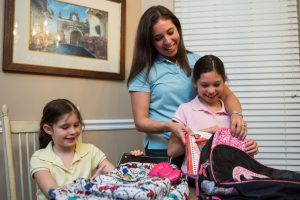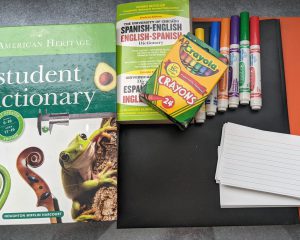About this series
- Summer is in full swing and school supplies will be top-of-mind soon as parents and teachers grapple with getting their students and classrooms ready for a new school year.
- The ripple effects of the yearslong COVID pandemic continue to surface in economies worldwide, and school supplies are not exempt.
- To help parents and teachers find ways to save, experts at the University of Florida Institute of Food and Agricultural Science offer research-based information and tips to keep expenses down when stocking up on school supplies.
In a couple of weeks, from August 1-31, Florida will hold its annual school sales tax holiday.
During that period, consumers can curb school supply costs with savings designated by the Florida legislature.

“Taking advantage of the Sales Tax Holiday is one way to make reductions in back-to-school supplies, as needed, purchasing only the essentials so that income equals expenses plus savings,” says Jenny Rodriguez, one of several UF/IFAS Extension agents through the state specializing in family and consumer sciences. “If you’re not sure where to begin, consider the following money management strategies to help manage your finances.”
Here, Rodriguez adds six strategies to keep costs down when shopping for school supplies throughout the summer.
- Take inventory of your stock supplies at home first. Often, you already have many of the school supplies your kids need at home. See if you have highlighters, pens, pencils, notebooks, and other school supplies saved up from prior years before buying more of the same. The savings may seem small, but it will add up and every little bit helps.
- Look for weekly deals on select products. If purchasing supplies for more than one child, you can also seek out weekly deals that highlight a small handful of products each week, sometimes as low as 25 cents.
- Avoid using store credit cards. If you are offered one while checking out, politely decline. While those sign-up bonuses can be great and tempting, if you carry a balance on one of these cards, the interest you pay with those high APRs (averaging 24.24% APR) will easily exceed what you saved with that initial discount the store offered you.
 Swap school supplies and spread the savings. If done right, setting up a swap system of items with other families has plenty of perks. Start by trading items with other families like a surplus of supplies, kids’ clothing, shoes, and accessories. Here is how it works. Gather your friends and neighbors with kids around the same age and everyone bring gently used clothing, books, school supplies, toys, etc. Everyone receives a ticket for each item they bring. Each ticket entitles you to one item from the swap meet. If you contribute six books, you can leave with up to six new-to-you books. If you contribute seven items of clothing, you can leave with up to seven new-to-you items of clothing. All leftover items are donated. Giving is good.
Swap school supplies and spread the savings. If done right, setting up a swap system of items with other families has plenty of perks. Start by trading items with other families like a surplus of supplies, kids’ clothing, shoes, and accessories. Here is how it works. Gather your friends and neighbors with kids around the same age and everyone bring gently used clothing, books, school supplies, toys, etc. Everyone receives a ticket for each item they bring. Each ticket entitles you to one item from the swap meet. If you contribute six books, you can leave with up to six new-to-you books. If you contribute seven items of clothing, you can leave with up to seven new-to-you items of clothing. All leftover items are donated. Giving is good.- Try secondhand shopping. Consider shopping second-hand through places like Offerup.com, Goodwill, Salvation Army and thrift stores. Don’t forget to look for deal and sign up for emails strategically.
- Don’t forget UF/IFAS Extension has tools to help you save. Did you know that UF/IFAS Extension has money management class and tools to help you budget? Obtain a free money management calendar to help you track your expenses or sign up to take a money management class by reaching out to your local UF/IFAS Extension Family and Consumer Sciences agent or email jennyarodriguez@ufl.edu.
By Lourdes Mederos, rodriguezl@ufl.edu
Para accesar a esta comunicación en español. por favor utilice este enlace.
###
ABOUT UF/IFAS
The mission of the University of Florida Institute of Food and Agricultural Sciences (UF/IFAS) is to develop knowledge relevant to agricultural, human and natural resources and to make that knowledge available to sustain and enhance the quality of human life. With more than a dozen research facilities, 67 county Extension offices, and award-winning students and faculty in the UF College of Agricultural and Life Sciences, UF/IFAS brings science-based solutions to the state’s agricultural and natural resources industries, and all Florida residents.
 0
0
 Swap school supplies and spread the savings. If done right, setting up a swap system of items with other families has plenty of perks. Start by trading items with other families like a surplus of supplies, kids’ clothing, shoes, and accessories. Here is how it works. Gather your friends and neighbors with kids around the same age and everyone bring gently used clothing, books, school supplies, toys, etc. Everyone receives a ticket for each item they bring. Each ticket entitles you to one item from the swap meet. If you contribute six books, you can leave with up to six new-to-you books. If you contribute seven items of clothing, you can leave with up to seven new-to-you items of clothing. All leftover items are donated. Giving is good.
Swap school supplies and spread the savings. If done right, setting up a swap system of items with other families has plenty of perks. Start by trading items with other families like a surplus of supplies, kids’ clothing, shoes, and accessories. Here is how it works. Gather your friends and neighbors with kids around the same age and everyone bring gently used clothing, books, school supplies, toys, etc. Everyone receives a ticket for each item they bring. Each ticket entitles you to one item from the swap meet. If you contribute six books, you can leave with up to six new-to-you books. If you contribute seven items of clothing, you can leave with up to seven new-to-you items of clothing. All leftover items are donated. Giving is good.